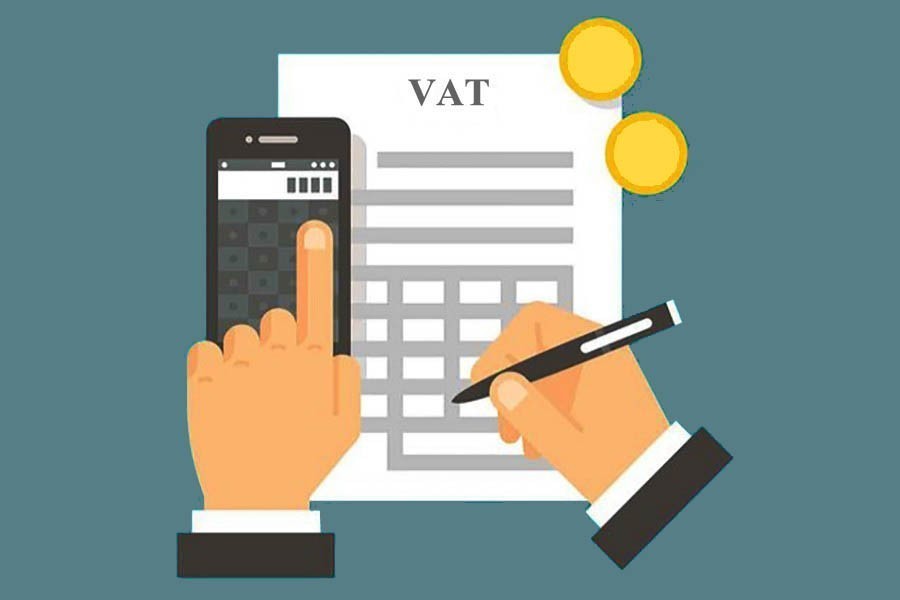
Published :
Updated :

Over Tk1.50 trillion in value-added tax (VAT) remains out of net every year for weaknesses and loopholes in the collection system, still far off automation. No wonder, feel economists, efforts of the government to increase revenue receipts go in vain each year.
The National Board of Revenue (NBR) says that in the fiscal 2021, it had expected to collect around Tk2.5 trillion as 15 per cent VAT from transactions worth Tk16.6 trillion in 11 sectors. But the amount managed was a little over Tk970 billion, that's about 40 per cent of the projected sum.
Economists take the official statistics with a grain of salt. They say that the recurrent gap should be much greater. The shortfall in VAT collection was at least Tk2.5 trillion, they feel.
Such below par VAT collection is attributed to a lack of automation, huge traceless transactions, limitations and loopholes in the new VAT law, evading tendency, higher rates besides not using the much-touted electronic devices.
The Federation of Bangladesh Chambers of Commerce and Industry (FBCCI) feels, 'Many businesses shy away from VAT registration for fear of harassment.'
Against the backdrop, the NBR has formed a committee, led by the director-general of Customs Intelligence and Investigation, to find out how to enhance VAT collection. The committee has been asked to submit a report on the issues involved, including structural reforms of VAT management, with possible impacts on revenue collection due to the new VAT rates, showed reports published by dailies.
In the FY21, 15 sectors contributed nearly Tk 3.0 trillion to the exchequer and 11 sectors were due to pay VAT at different rates. Four other sectors-- agriculture and livestock, fisheries, public administration and defence, and health and social safety--enjoy VAT exemption. And nine out of the 11 sectors enjoy VAT waiver ranging from 5.0 per cent to 99 per cent, say officials.
NBR officials know that the gap in VAT collection could be wider. They also know that the overall revenue mobilisation remains low. Bangladesh's revenue collection was 10 per cent or more of the gross domestic product (GDP), which dropped to 9.0 per cent in the last two years.
Economists call for bringing discipline in the VAT-collection system to increase revenue collection to the optimum level. They note that the Scandinavian countries collect 90 per cent of their GDP or more as revenue.
They suggest structural reforms in the revenue administration to augment VAT collection in Bangladesh to the optimum level. Bangladesh also needs to introduce automation in the whole system and plug the loopholes, they feel.
It was in 1991 that Bangladesh introduced the value-added tax, opposed by Awami League (AL), then in the opposition. Now the AL government feels happy with the VAT system as it became the cash for revenue receipts.
In 2012, the government improved VAT-management system that was scheduled to be implemented from 2015. But, in the face of objections from traders, it was made effective in 2019 with major alterations.
According to the Bangladesh Bureau of Statistics, there are about 8 million small and large business units in the country, but only about 0.30 million of them have Business Identification Number (BIN) since the new VAT law was made effective and 33 per cent of them don't submit monthly returns.
The failure to introduce online transactions is blamed as a big reason for low VAT collection. Distortions in the implementation of the VAT law enacted in 2012, lack of proper implementation of automation project and a poor coordination among VAT, customs and income tax departments within the NBR are also blamed for the lower VAT collection.
The government has introduced electronic fiscal devices to keep accurate account of transactions in 26 types of businesses, including shops. But over the last three years, only about 3,500 business organisations have taken the devices. There are also allegations that all transactions are not done using electronic devices.
NBR officials expect that the new law will be effective if the process could be fully automated.
jehangirh@yahoo.com


 For all latest news, follow The Financial Express Google News channel.
For all latest news, follow The Financial Express Google News channel.